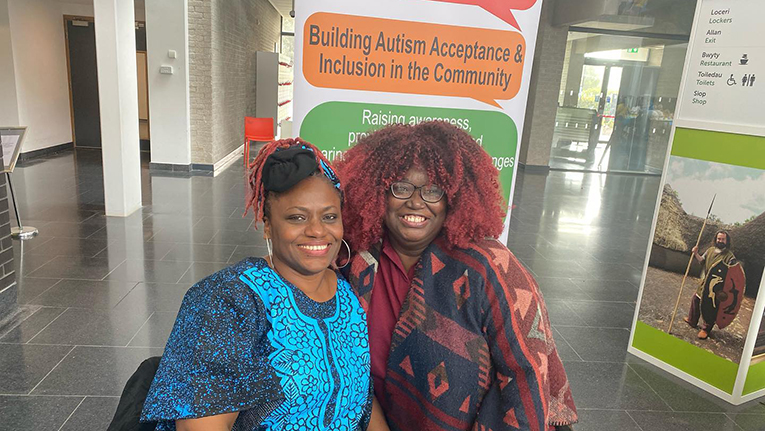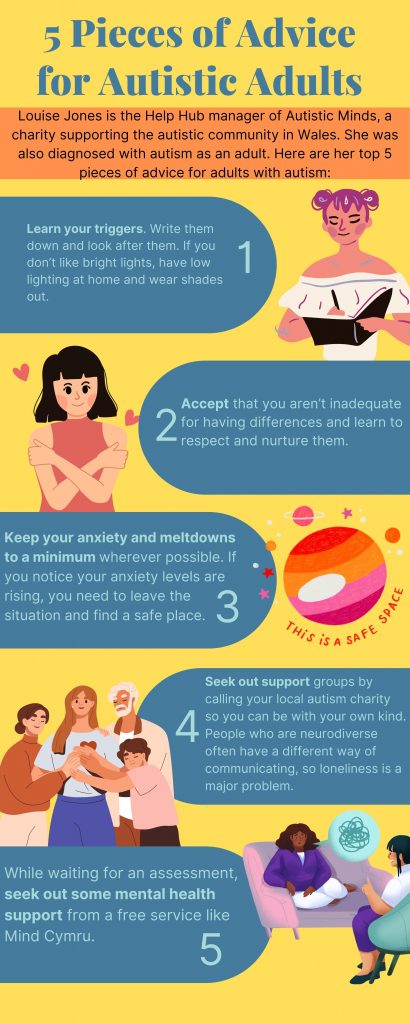Demand for diagnosis is outstripping the capacity of Wales’s autism services. But this demand may signal a positive change in Welsh attitudes towards autism

Five years ago, Wales became the UK’s first country to launch a national service for adults seeking an autism diagnosis or support.
The latest data report of the Integrated Autism Service (IAS) found that over half of adults referred to the service were requesting a diagnosis.
However, a recent independent review has now found that demand for an autism diagnosis is outstripping the service’s capacity.
This finding has led to the review asking an important question: Is increasing demand a problem or to be celebrated?
Chris Haines, who works for National Autistic Society Cymru, argues the high demand for assessments reflects a better understanding of autism in Wales. “The myth that women and girls can’t be autistic has been tackled in recent years, so a lot more women and girls are coming forward now,” says the external affairs manager.
Haines also explains that one of the most positive elements of the IAS is that adults can self-refer. Previously, only health professionals could refer adults for an assessment. “Autistic adults can struggle with communicating their difficulties, and a GP might not pick up on autism,” he says.
Lost generation meets new generation
Many adults who refer themselves to the IAS for a diagnosis may be parents of autistic children, says Yvonne Odukwe of Autism’s Hidden Voices, a Newport-based charity that aims to destigmatise autism in cultural groups across Wales. “I think the majority of adults coming forward for a diagnosis have autistic children, so autism is already normalised,” says the director of the charity.
Odukwe says that as more children are being readily identified as autistic, more parents are realising they may have autism, too. “I think a lot of adults are seeing symptoms in their children which are making them question themselves,” she says.

Gareth Croot was diagnosed with autism in September 2022 and says he sought a diagnosis after his infant son was diagnosed. “My mother said he was a lot like me when I was little,” says the 41-year-old Swansea native.
Croot says that the diagnosis explained his dislike of social interaction and the “tantrums” he had as a child.
“I started looking into things more,” he says. “It all started to click.”
Find out more about the Integrated Autism Service:
Establishing an identity later in life
The review found that over 70% of adults accessing the IAS were aged 18-45. Haines believes that a lot of these adults attended school at a time when autism was not readily identified.
“They’re most likely to have had lower support needs,” he says. “That’s why there’s a pent-up demand of people in their 30s and 40s.”
39-year-old Matthew Enos was diagnosed with autism in October 2022.
Autism “wasn’t really picked up” during Enos’s school days, and he experienced mental health issues throughout his adolescence. At 16, he was diagnosed with post-traumatic stress disorder.

He says he didn’t question whether he had autism until 2018, after his partner discussed the possibility with a relative. “I began to do online tests and was scoring very high, so I referred myself to the IAS,” he says.
While Enos hopes to soon attend aftercare sessions, receiving a full report on his condition is “most important” to him.
“I’d like to read the service’s opinions on where I am on the spectrum and advice for the future,” says the Porth native, who wishes to receive employment advice after experiencing a work environment that was “not sympathetic or understanding” of his disability.
According to Enos, he was pleased with the diagnosis, but also found it bittersweet.
“If you know what you’re dealing with, you’re able to look into it a bit more,” he says. “I do feel a bit sad that it took this long to know what it was I was struggling with.”
Attitudes in Wales
While adults aged between 26-45 were the second largest group accessing the service, the largest age group were young adults (18-25).
According to Haines, young adults may seek a diagnosis during transitional periods, such as starting university.
I thought that a diagnosis would help me better understand myself
Kayleigh Leiva
American mental health worker Kaleigh Leiva first sought a diagnosis when they started studying at the University of Southern Mississippi. “I moved out of my parents’ house and was on my own, so I thought that a diagnosis would help me better understand myself,” says the 23-year-old.

However, the cost of a diagnosis in the US deterred them from pursuing an assessment. Once they transferred to Swansea University, however, a diagnosis seemed possible.
With the help of the University’s autism team, they were referred to the IAS in autumn 2019 and diagnosed in April 2021 at age 21. “It was a relief – I finally knew why I was different,” says the Mississippi native.
Leiva believes the perception of autism in Wales is more positive than in the US, and they often wonder if being diagnosed as a child in Mississippi would have had a negative impact.
“I’m from a small town and we don’t have the resources in schools,” they admit. “I don’t even know how I would get a diagnosis in my hometown. Swansea University had autism practitioners. There’s more of an understanding in Wales.”
This increased understanding has led to more adults requesting a diagnosis, so should the overwhelming demand be celebrated?
Judging by the independent review’s recommendations, it should.
The review recommended the service actively engage with underrepresented groups – despite acknowledging it could raise demand.
So, five years from now, increased demand may not only be seen as a problem – it may also be seen as success.
